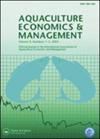中国上海城市消费者水产品消费支出的决定因素
IF 3.8
2区 经济学
Q1 AGRICULTURAL ECONOMICS & POLICY
引用次数: 5
摘要
摘要中国水产品消费持续增长,并鼓励扩大水产养殖场。对影响所有水产品、淡水鱼、鱿鱼/章鱼和贝类支出的因素的调查使用了从中国上海居民那里收集的调查数据。Tobit建模方法的使用将收入、水产品安全认知和质量偏好等社会人口统计变量确定为水产品类别支出的重要决定因素。支出往往随着年龄的增长而增加,但教育的影响因具体类别而异,这表明受过教育的消费者有不同的选择。妻子在水产品上的花费往往比丈夫少得多。对过去因摄入水产品而患病的了解导致所有类别的支出都有所下降,而质量认证、认证有机原产地和认证水产养殖产品增加了选定类别的支出。监测消费者的社会人口状况并建立透明的质量认证系统将有利于水产养殖场和水产品营销人员。本文章由计算机程序翻译,如有差异,请以英文原文为准。
Determinants of urban consumer expenditure on aquatic products in Shanghai, China
Abstract Consumption of aquatic products in China continues to grow and encourages the expansion of aquaculture farms. The examination of factors influencing expenditures on all aquatic products, freshwater fish, squid/octopus, and shellfish uses survey data collected from residents of Shanghai, China. The use of the Tobit modeling approach identified socio-demographic variables such as income, aquatic product safety perceptions, and preferences for quality as significant determinants of expenditures on aquatic product categories. Expenditures tend to increase with age, but the effect of education varies with regard to specific categories, suggesting distinct choices of educated consumers. Wives tend to spend substantially less on aquatic products than husbands. Knowledge of past sickness due to ingestion of aquatic products causes expenditures to drop in all categories, while quality certification, certified organic origin, and certified aquaculture products increase expenditure in selected categories. Monitoring consumer socio-demographic profiles and establishing transparent quality certification systems will benefit aquaculture farms and aquatic product marketers.
求助全文
通过发布文献求助,成功后即可免费获取论文全文。
去求助
来源期刊

Aquaculture Economics & Management
FISHERIES-
CiteScore
7.30
自引率
17.90%
发文量
21
期刊介绍:
Aquaculture Economics and Management is a peer-reviewed, international journal which aims to encourage the application of economic analysis to the management, modeling, and planning of aquaculture in public and private sectors. The journal publishes original, high quality papers related to all aspects of aquaculture economics and management including aquaculture production and farm management, innovation and technology adoption, processing and distribution, marketing, consumer behavior and pricing, international trade, policy analysis, and the role of aquaculture in food security, livelihoods, and environmental management. Papers are peer reviewed and evaluated for their scientific merits and contributions.
 求助内容:
求助内容: 应助结果提醒方式:
应助结果提醒方式:


